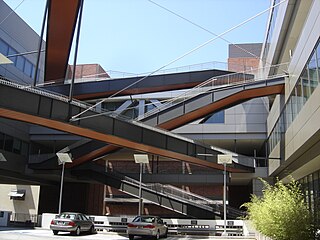Zhejiang California International NanoSystems Institute (Traditional Chinese: 浙江加州國際納米研究院, Simplified Chinese: 浙江加州国际纳米研究院; abbr. ZCINI), is a Sino-American co-founded institute for nanoscience and nanotechnology research located in Hangzhou, Zhejiang Province, People's Republic of China.
An institute is an organisational body created for a certain purpose.
Nanotechnology ("nanotech") is manipulation of matter on an atomic, molecular, and supramolecular scale. The earliest, widespread description of nanotechnology referred to the particular technological goal of precisely manipulating atoms and molecules for fabrication of macroscale products, also now referred to as molecular nanotechnology. A more generalized description of nanotechnology was subsequently established by the National Nanotechnology Initiative, which defines nanotechnology as the manipulation of matter with at least one dimension sized from 1 to 100 nanometers. This definition reflects the fact that quantum mechanical effects are important at this quantum-realm scale, and so the definition shifted from a particular technological goal to a research category inclusive of all types of research and technologies that deal with the special properties of matter which occur below the given size threshold. It is therefore common to see the plural form "nanotechnologies" as well as "nanoscale technologies" to refer to the broad range of research and applications whose common trait is size. Because of the variety of potential applications, governments have invested billions of dollars in nanotechnology research. Through 2012, the USA has invested $3.7 billion using its National Nanotechnology Initiative, the European Union has invested $1.2 billion, and Japan has invested $750 million.

Hangzhou formerly romanized as Hangchow, is the capital and most populous city of Zhejiang Province in East China. It sits at the head of Hangzhou Bay, which separates Shanghai and Ningbo. Hangzhou grew to prominence as the southern terminus of the Grand Canal and has been one of the most renowned and prosperous cities in China for much of the last millennium. The city's West Lake, a UNESCO World Heritage site immediately west of the city, is among its best-known attractions. A study conducted by PwC and China Development Research Foundation saw Hangzhou ranked first among "Chinese Cities of Opportunity". Hangzhou is also considered a World City with a "Beta+" classification according to GaWC.







